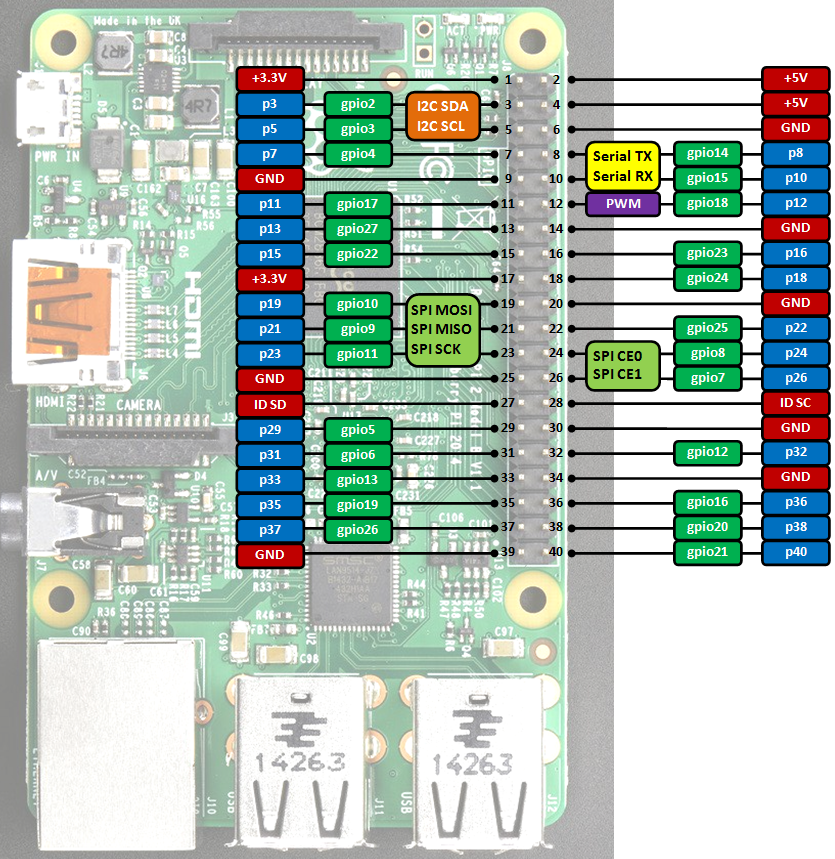mbed API for Raspberry Pi boards.
mbedPi
This is an attempt to implement a limited number of mbed APIs for Raspberry Pi single-board computers. The project was inspired by and based on the arduPi library developed for the Arduino by Cooking Hacks .
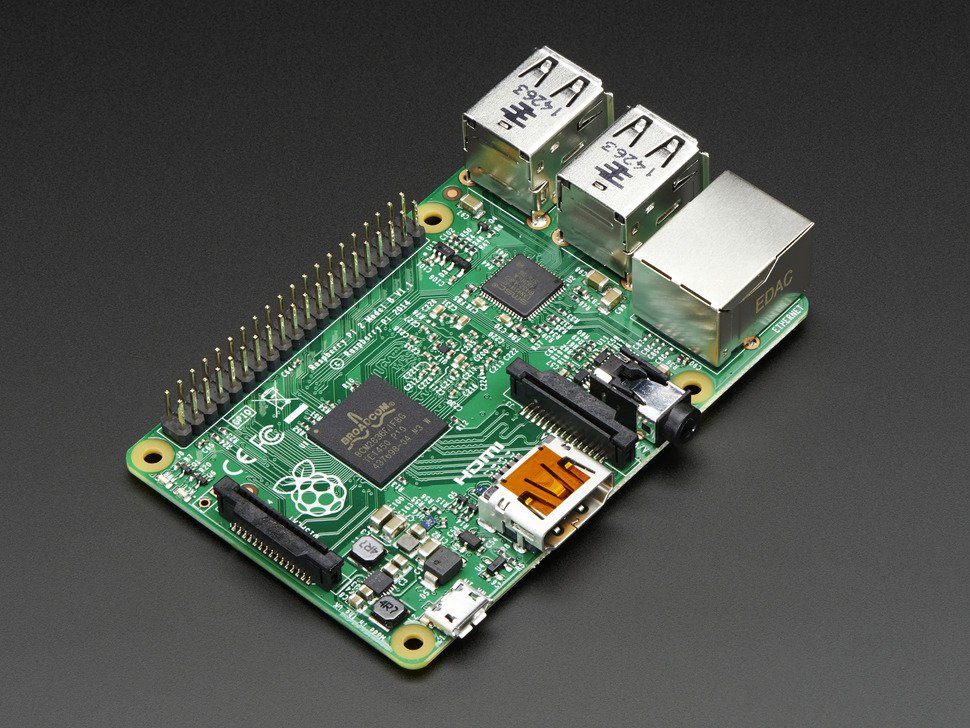
Specifications
- Chip: Broadcom BCM2836 SoC
- Core architecture: Quad-core ARM Cortex-A7
- CPU frequency: 900 MHz
- GPU: Dual Core VideoCore IV® Multimedia Co-Processor
- Memory: 1GB LPDDR2
- Operating System: Boots from Micro SD card, running a version of the Linux operating system
- Power: Micro USB socket 5V, 2A
Connectors
- Ethernet: 10/100 BaseT Ethernet socket
- Video Output: HDMI (rev 1.3 & 1.4)
- Audio Output: 3.5mm jack, HDMI
- USB: 4 x USB 2.0 Connector
- GPIO Connector: 40-pin 2.54 mm (100 mil) expansion header: 2x20 strip providing 27 GPIO pins as well as +3.3 V, +5 V and GND supply lines
- Camera Connector: 15-pin MIPI Camera Serial Interface (CSI-2)
- JTAG: Not populated
- Display Connector: Display Serial Interface (DSI) 15 way flat flex cable connector with two data lanes and a clock lane
- Memory Card Slot: Micro SDIO
GPIO connector pinout
Information
Only the labels printed in blue/white or green/white (i.e. p3, gpio2 ...) must be used in your code. The other labels are given as information (alternate-functions, power pins, ...).
Building programs for the Raspberry Pi with mbedPi
I use Qt Creator for development, however you can use any other IDE available on the Raspberry Pi (e.g. Geany) if you like. For a quick try:
- Install Qt and the Qt Creator onto your Raspberry Pi. Then create a new "Blinky" Plain non-Qt C++ Project as follows:
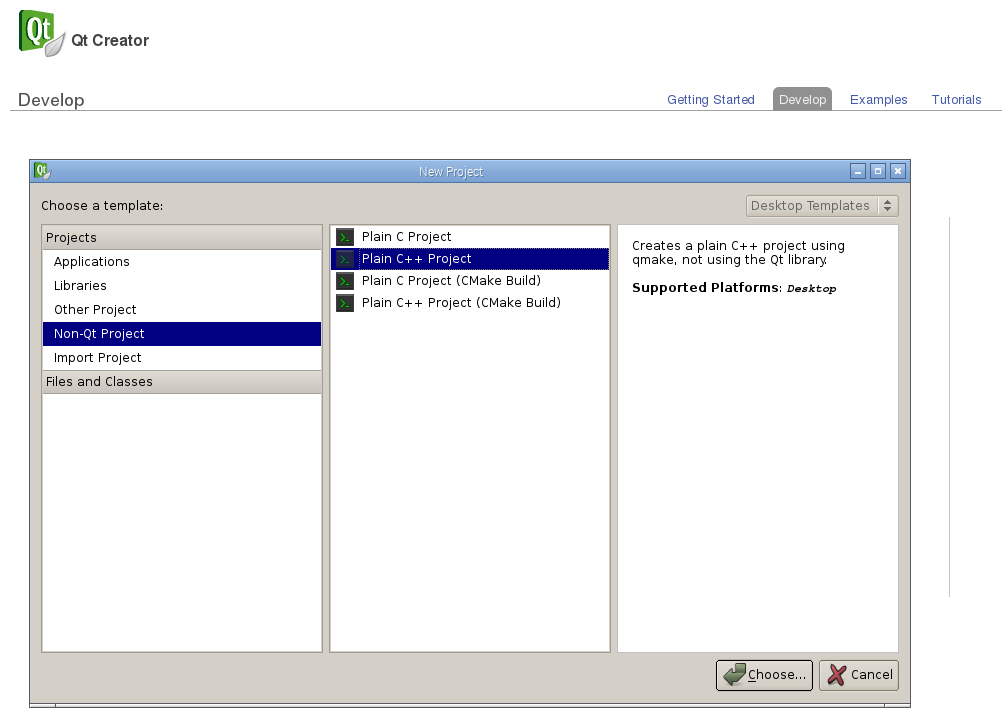
- Change the main code as below:
main.cpp
#include "mbedPi.h"
int main()
{
DigitalOut myled(p7);
while(1) {
myled = 1; // LED is ON
wait(0.2); // 200 ms
myled = 0; // LED is OFF
wait(1.0); // 1 sec
printf("Blink\r\n");
}
}
- Copy the mbedPi.zip file into your project's folder and unzip.
- Add the mbedPi.h and mbedPi.cpp files to your project by right clicking on the "Blinky" project and then clicking on the "Add Existing Files..." option in the local menu:
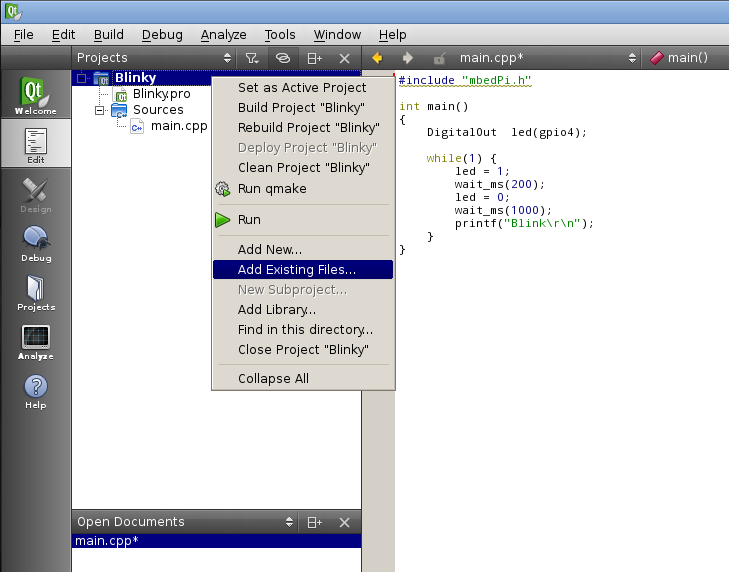
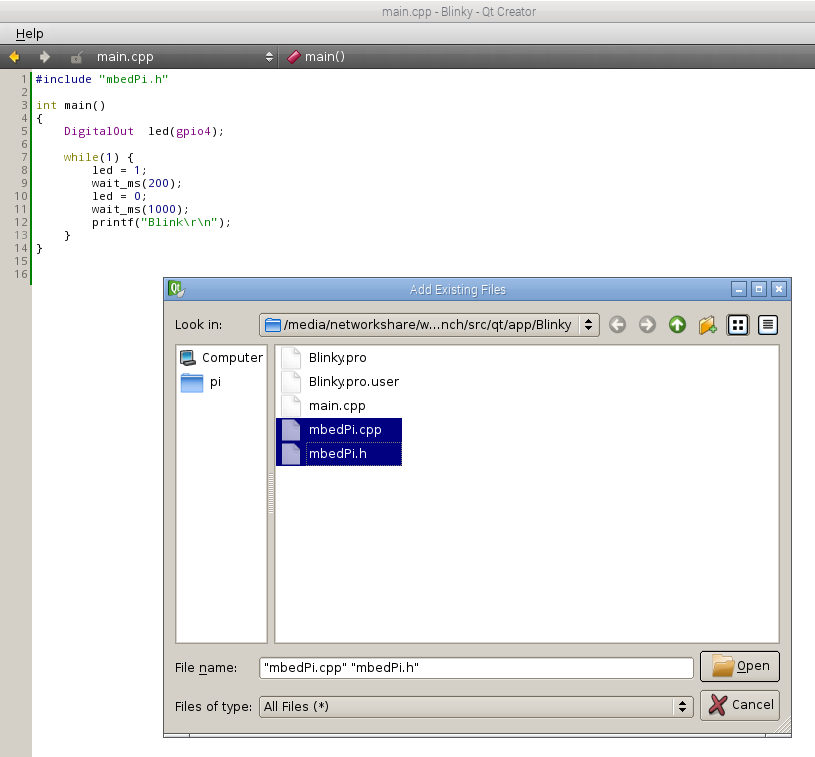
- Double click on Blinky.pro to open it for editing and add new libraries by inserting a new line as follows:
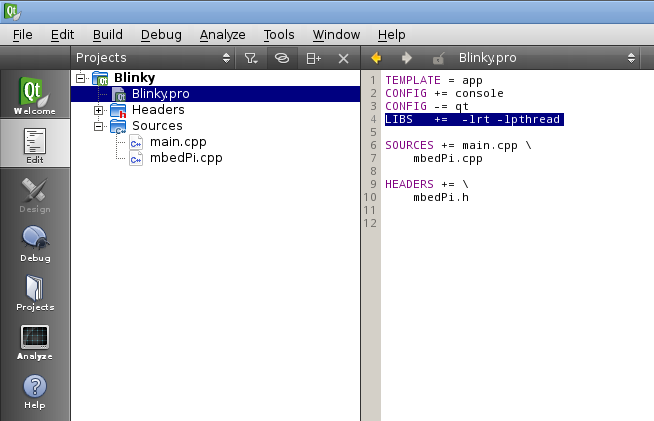
- Compile the project.
- Connect an LED through a 1k resistor to pin 7 and the ground on the Raspberry Pi GPIO connector.
- Run the binary as sudo (sudo ./Blinky) and you should see the LED blinking.

- Press Ctrl+c to stop running the application.
source/Peripheral.cpp
- Committer:
- hudakz
- Date:
- 18 months ago
- Revision:
- 2:131555dc6fb7
- Parent:
- 1:1f2d9982fa8c
File content as of revision 2:131555dc6fb7:
//#include "mbed.h"
#include "BCM2835.h"
#include "Thread.h"
#include "ThisThread.h"
#include "Peripheral.h"
struct bcm2835_peripheral bsc_rev1 = { BCM2835_PERI_BASE + 0X205000, 0, 0, 0 };
struct bcm2835_peripheral bsc_rev2 = { BCM2835_PERI_BASE + 0X804000, 0, 0, 0 };
struct bcm2835_peripheral bsc0;
struct bcm2835_peripheral gpio = { BCM2835_PERI_BASE + 0x200000, 0, 0, 0 };
timeval start_program, end_point;
off_t bcm2835_peripherals_base = BCM2835_PERI_BASE;
size_t bcm2835_peripherals_size = BCM2835_PERI_SIZE;
volatile uint32_t* bcm2835_peripherals;
volatile uint32_t* bcm2835_pwm = (uint32_t *)MAP_FAILED;
volatile uint32_t* bcm2835_clk = (uint32_t *)MAP_FAILED;
volatile uint32_t* bcm2835_bsc1 = (uint32_t *)MAP_FAILED;
volatile uint32_t* bcm2835_spi0 = (uint32_t *)MAP_FAILED;
volatile uint32_t* bcm2835_st = (uint32_t *)MAP_FAILED;
//Constructor
Peripheral::Peripheral()
{
REV = getBoardRev();
if (map_peripheral(&gpio) == -1) {
printf("Failed to map the physical GPIO registers into the virtual memory space.\n");
}
memfd = -1;
// Open the master /dev/memory device
if ((memfd = open("/dev/mem", O_RDWR | O_SYNC)) < 0) {
fprintf(stderr, "bcm2835_init: Unable to open /dev/mem: %s\n", strerror(errno));
exit(1);
}
bcm2835_peripherals = mapmem("gpio", bcm2835_peripherals_size, memfd, bcm2835_peripherals_base);
if (bcm2835_peripherals == MAP_FAILED)
exit(1);
/* Now compute the base addresses of various peripherals,
// which are at fixed offsets within the mapped peripherals block
// Caution: bcm2835_peripherals is uint32_t*, so divide offsets by 4
*/
bcm2835_pwm = bcm2835_peripherals + BCM2835_GPIO_PWM/4;
bcm2835_clk = bcm2835_peripherals + BCM2835_CLOCK_BASE/4;
bcm2835_spi0 = bcm2835_peripherals + BCM2835_SPI0_BASE/4;
bcm2835_bsc1 = bcm2835_peripherals + BCM2835_BSC1_BASE/4; /* I2C */
bcm2835_st = bcm2835_peripherals + BCM2835_ST_BASE/4;
// start timer
gettimeofday(&start_program, NULL);
}
//Destructor
Peripheral::~Peripheral()
{
unmap_peripheral(&gpio);
bcm2835_pwm = (uint32_t *)MAP_FAILED;
bcm2835_clk = (uint32_t *)MAP_FAILED;
bcm2835_spi0 = (uint32_t *)MAP_FAILED;
bcm2835_bsc1 = (uint32_t *)MAP_FAILED;
}
/*******************
* Private methods *
*******************/
// Exposes the physical address defined in the passed structure using mmap on /dev/mem
int Peripheral::map_peripheral(struct bcm2835_peripheral* p)
{
// Open /dev/mem
if ((p->mem_fd = open("/dev/mem", O_RDWR | O_SYNC)) < 0) {
printf("Failed to open /dev/mem, try checking permissions.\n");
return -1;
}
p->map = mmap
(
NULL,
BLOCK_SIZE,
PROT_READ | PROT_WRITE,
MAP_SHARED,
p->mem_fd, // File descriptor to physical memory virtual file '/dev/mem'
p->addr_p // Address in physical map that we want this memory block to expose
);
if (p->map == MAP_FAILED) {
perror("mmap");
return -1;
}
p->addr = (volatile unsigned int*)p->map;
return 0;
}
/**
* @brief
* @note
* @param
* @retval
*/
void Peripheral::unmap_peripheral(struct bcm2835_peripheral* p)
{
munmap(p->map, BLOCK_SIZE);
unistd::close(p->mem_fd);
}
//
// Low level convenience functions
//
/**
* @brief
* @note
* @param
* @retval
*/
uint32_t* mapmem(const char* msg, size_t size, int fd, off_t off)
{
uint32_t* map = (uint32_t*)mmap(NULL, size, (PROT_READ | PROT_WRITE), MAP_SHARED, fd, off);
if (MAP_FAILED == map)
fprintf(stderr, "bcm2835_init: %s mmap failed: %s\n", msg, strerror(errno));
return map;
}
// safe read from peripheral
uint32_t bcm2835_peri_read(volatile uint32_t* paddr)
{
uint32_t ret = *paddr;
ret = *paddr;
return ret;
}
// read from peripheral without the read barrier
uint32_t bcm2835_peri_read_nb(volatile uint32_t* paddr)
{
return *paddr;
}
// safe write to peripheral
void bcm2835_peri_write(volatile uint32_t* paddr, uint32_t value)
{
*paddr = value;
*paddr = value;
}
// write to peripheral without the write barrier
void bcm2835_peri_write_nb(volatile uint32_t* paddr, uint32_t value)
{
*paddr = value;
}
// Set/clear only the bits in value covered by the mask
void bcm2835_peri_set_bits(volatile uint32_t* paddr, uint32_t value, uint32_t mask)
{
uint32_t v = bcm2835_peri_read(paddr);
v = (v &~mask) | (value & mask);
bcm2835_peri_write(paddr, v);
}
/**
* @brief
* @note
* @param
* @retval
*/
int getBoardRev()
{
FILE* cpu_info;
char line[120];
char* c, finalChar;
//static int rev = 0;
if (REV != 0)
return REV;
if ((cpu_info = fopen("/proc/cpuinfo", "r")) == NULL) {
fprintf(stderr, "Unable to open /proc/cpuinfo. Cannot determine board reivision.\n");
exit(1);
}
while (fgets(line, 120, cpu_info) != NULL) {
if (strncmp(line, "Revision", 8) == 0)
break;
}
fclose(cpu_info);
if (line == NULL) {
fprintf(stderr, "Unable to determine board revision from /proc/cpuinfo.\n");
exit(1);
}
for (c = line; *c; ++c)
if (isdigit(*c))
break;
if (!isdigit(*c)) {
fprintf(stderr, "Unable to determine board revision from /proc/cpuinfo\n");
fprintf(stderr, " (Info not found in: %s\n", line);
exit(1);
}
finalChar = c[strlen(c) - 2];
if ((finalChar == '2') || (finalChar == '3')) {
bsc0 = bsc_rev1;
return 1;
}
else {
bsc0 = bsc_rev2;
return 2;
}
}
/**
* @brief
* @note
* @param
* @retval
*/
void attachInterrupt(PinName p, void (*f) (), Digivalue m)
{
int GPIOPin = p;
pthread_t* threadId = getThreadIdFromPin(p);
struct ThreadArg* threadArgs = (ThreadArg*)malloc(sizeof(ThreadArg));
threadArgs->func = f;
threadArgs->pin = GPIOPin;
//Export pin for interrupt
FILE* fp = fopen("/sys/class/gpio/export", "w");
if (fp == NULL) {
fprintf(stderr, "Unable to export pin %d for interrupt\n", p);
exit(1);
}
else {
fprintf(fp, "%d", GPIOPin);
}
fclose(fp);
//The system to create the file /sys/class/gpio/gpio<GPIO number>
//So we wait a bit
ThisThread::sleep_for_ms(1);
char* interruptFile = NULL;
asprintf(&interruptFile, "/sys/class/gpio/gpio%d/edge", GPIOPin);
//Set detection condition
fp = fopen(interruptFile, "w");
if (fp == NULL) {
fprintf(stderr, "Unable to set detection type on pin %d\n", p);
exit(1);
}
else {
switch (m) {
case RISING:
fprintf(fp, "rising");
break;
case FALLING:
fprintf(fp, "falling");
break;
default:
fprintf(fp, "both");
break;
}
}
fclose(fp);
if (*threadId == 0) {
//Create a thread passing the pin and function
pthread_create(threadId, NULL, threadFunction, (void*)threadArgs);
}
else {
//First cancel the existing thread for that pin
pthread_cancel(*threadId);
//Create a thread passing the pin, function and mode
pthread_create(threadId, NULL, threadFunction, (void*)threadArgs);
}
}
/**
* @brief
* @note
* @param
* @retval
*/
void detachInterrupt(PinName p)
{
int GPIOPin = p;
FILE* fp = fopen("/sys/class/gpio/unexport", "w");
if (fp == NULL) {
fprintf(stderr, "Unable to unexport pin %d for interrupt\n", p);
exit(1);
}
else {
fprintf(fp, "%d", GPIOPin);
}
fclose(fp);
pthread_t* threadId = getThreadIdFromPin(p);
pthread_cancel(*threadId);
}
Peripheral peripheral = Peripheral();
